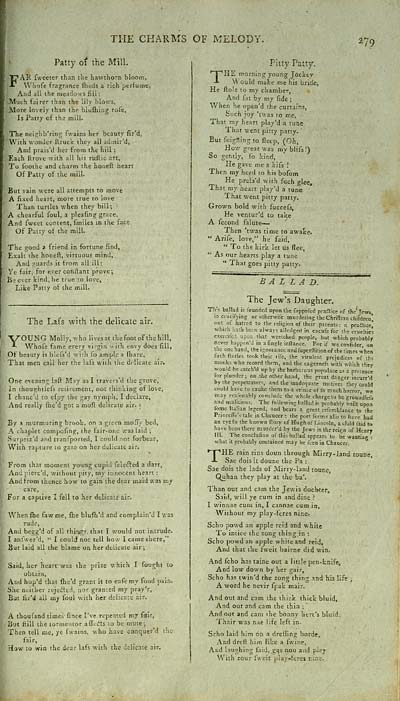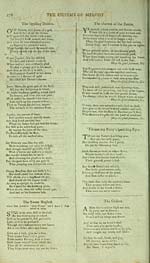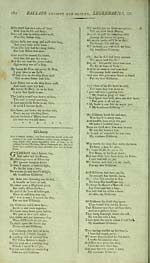Glen Collection of printed music > Printed text > Charms of melody, or, Siren medley
(267) Page 279 - Patty of the mill
Download files
Complete book:
Individual page:
Thumbnail gallery: Grid view | List view

THE CHARMS OF MELODY.
279
Patty dt the Mill.
FAR fweeter than the hawthorn bloom,
Wliofe fragrance fheds a rich perfume,
And all the meadows fill;
'Much fairer than the lily blows,
More lovely than the blufhing rofe.
Is Patty of the mill.
The neiffhb'ring fwains her beauty fir'd,
■ With wonder flrucfe they all ad.-nir'd,
And prais'd her from the hill ;
Each ftrove with all his ruftic art,
To foothe and charm the honeft heart
Of Patty of the mill.
But vain were all attempts to move
A fixed heart, more true to love
Than turtles when they bill;
A chearful foul, a pleafing grace.
And fweet content, fmiks in the face
Of Patty of the mill.
The good ? friend in fortune find,
Exalt the honeft, virtuous mind,
And 3;uards it from all ill:
Ye fair, for ever conftant prove;
Be ever kind, be true to love,
Like Patty of the mill.
The Lafs with the delicate air.
YOUNG Molly, who lives at the foot of the hill,
Whofe fame every virgin with envy does fill,
Of beauty is blefs'd with fo ample a fhare.
That men call her the lafs with the delicate air.
One evening l?.ft Mny as I traversM the grove,
In thoughtlefs retirement, not thinking of love,
I chanc'd to efpy the gay nymph, I declare,
And really fne'd got a moft delicate air. <
By a murmuring brook, on a green moITy bed,
A chaplet compofing, the tair-oiie was laid ;
Suvpriz'd and tranfported, I could not forbear.
With rapture to gaze on her delicate air.
From that moment young cupid felefted a dart.
And pierc'd, without pity, my innocent heart :
And from thence how to gain the dear maid was my
care,
For a captive I fell to her delicate air.
When fhe faw me, fhe blufh'd and complain'd I was
rude.
And begg'd of all thiugf. that I would not intrude.
I anfwer'd, " I could not tell how I came there,"
But laid all the blame on her delicate air;
Said, her heart was the prize which I fought to
obtain.
And hop'd that fhe'd grant it to eafe my fond pain.
She neither lejedeH, nor granted my pray'r.
But fir'd all my foul with h«r delicate air.
A thoufand times fince I've repeated my fair.
But ftill the tormentor affefts to be mute;
Then tell me, ye fwains, who have conquer 'd the
fair.
How to win the dear lafs with the delicate air.
Piity Patty.
THE morning young Jockey
Would make me his bride.
He fiole to my chamber,
And fat by my fide ;
When he open'd the curtains,
Such joy 'twas to me.
That my heart play'd a tune
That v.'ent pitty patty.
But feigning to lleep, (Oh,
How great was my blifs I)
So gently, fo kind,
He gave me a kifs .'
Then my hcfd to his bofom
He prel's'd with fuch glee.
That my heart play'd a tune
That went pitty patty.
Grown bold with fuccefs.
He ventur'd to take
A fecond falute—
Then 'twas time to awate.
« Arife, love," he faid.
" To the kirk let us flee,
" As our hearts play a tune
" That goes pitty patty.
BALLAD.
The Jew's Daughter.
Th's ballad is founded upon the fiippofcd praftice of the' Jews
in crucifying or otherwife murdering the Chrillian children'
out of hatred to the religion of their parents: a praaice|
which iiath been always alledged in excnfe for the cruellies
exercifeJ upon that wretched people, but which probably
never happen'd in a fingle inftance. For if we confider, on
the one hand, theignorance and fuperftition of the times when
fuch ftcrics took their life, the virulent prejudices of ths
monks who record them, and the eagernefs with which they
would be catch'd up by the barbarous populace as a pretence
for plunder; on the other hand, the great danger incurr'd
by the perpetrators, and the inadequate motives they couW
could have to excite them to a crime of fo much horror we
may reafonably conclude the whole charge to be groun'dlefs
and malicious. The following ballad is probably built upon
fome Italian legend, and bears a great refemblance to the
Prioreffc's tale in Chaucer- the poet feems alfo to have had
an eye to the known ftory of Hugh of Lincoln, a child faid to
have been there murdcr'd by the Jews in the reign of Henry
III. The conclufion of this ballad appears to be wanting :
what it probably contained may be feen in Chaucer.
THE rain rins doun through Mirry-land toune,
Sae dois it doune the Pa :
Sae dois the lads ot Mirry-land toune,
Q^han they play at the ba'.
Than out and cam the Jewls doclKer,
Saitl, will ye cum in and dine ?
I winnae cum in, I cannae cum in,
Without my play-feres nine.
Scho powd an apple reid and white
To intice the zong thing in :
Scho powd an apple white and reid.
And that the fweit bairne did win.
And fcho has taine out a little pen-knifci
And low down by her rair,
Scho has twin'd the zong thing and his life ;
A word he nevir fpak mair. '
And out and cam the thick thick bluid,
And out and cam the thin ;
And out and cam the bonny hert's bluid;,
Thair was nae life left in.
Scho laid him on a drefling borde.
And dreft him like a fwlne,
And laughing faid.gqe nou and pley
With zour fweit play-feres rir,:.
279
Patty dt the Mill.
FAR fweeter than the hawthorn bloom,
Wliofe fragrance fheds a rich perfume,
And all the meadows fill;
'Much fairer than the lily blows,
More lovely than the blufhing rofe.
Is Patty of the mill.
The neiffhb'ring fwains her beauty fir'd,
■ With wonder flrucfe they all ad.-nir'd,
And prais'd her from the hill ;
Each ftrove with all his ruftic art,
To foothe and charm the honeft heart
Of Patty of the mill.
But vain were all attempts to move
A fixed heart, more true to love
Than turtles when they bill;
A chearful foul, a pleafing grace.
And fweet content, fmiks in the face
Of Patty of the mill.
The good ? friend in fortune find,
Exalt the honeft, virtuous mind,
And 3;uards it from all ill:
Ye fair, for ever conftant prove;
Be ever kind, be true to love,
Like Patty of the mill.
The Lafs with the delicate air.
YOUNG Molly, who lives at the foot of the hill,
Whofe fame every virgin with envy does fill,
Of beauty is blefs'd with fo ample a fhare.
That men call her the lafs with the delicate air.
One evening l?.ft Mny as I traversM the grove,
In thoughtlefs retirement, not thinking of love,
I chanc'd to efpy the gay nymph, I declare,
And really fne'd got a moft delicate air. <
By a murmuring brook, on a green moITy bed,
A chaplet compofing, the tair-oiie was laid ;
Suvpriz'd and tranfported, I could not forbear.
With rapture to gaze on her delicate air.
From that moment young cupid felefted a dart.
And pierc'd, without pity, my innocent heart :
And from thence how to gain the dear maid was my
care,
For a captive I fell to her delicate air.
When fhe faw me, fhe blufh'd and complain'd I was
rude.
And begg'd of all thiugf. that I would not intrude.
I anfwer'd, " I could not tell how I came there,"
But laid all the blame on her delicate air;
Said, her heart was the prize which I fought to
obtain.
And hop'd that fhe'd grant it to eafe my fond pain.
She neither lejedeH, nor granted my pray'r.
But fir'd all my foul with h«r delicate air.
A thoufand times fince I've repeated my fair.
But ftill the tormentor affefts to be mute;
Then tell me, ye fwains, who have conquer 'd the
fair.
How to win the dear lafs with the delicate air.
Piity Patty.
THE morning young Jockey
Would make me his bride.
He fiole to my chamber,
And fat by my fide ;
When he open'd the curtains,
Such joy 'twas to me.
That my heart play'd a tune
That v.'ent pitty patty.
But feigning to lleep, (Oh,
How great was my blifs I)
So gently, fo kind,
He gave me a kifs .'
Then my hcfd to his bofom
He prel's'd with fuch glee.
That my heart play'd a tune
That went pitty patty.
Grown bold with fuccefs.
He ventur'd to take
A fecond falute—
Then 'twas time to awate.
« Arife, love," he faid.
" To the kirk let us flee,
" As our hearts play a tune
" That goes pitty patty.
BALLAD.
The Jew's Daughter.
Th's ballad is founded upon the fiippofcd praftice of the' Jews
in crucifying or otherwife murdering the Chrillian children'
out of hatred to the religion of their parents: a praaice|
which iiath been always alledged in excnfe for the cruellies
exercifeJ upon that wretched people, but which probably
never happen'd in a fingle inftance. For if we confider, on
the one hand, theignorance and fuperftition of the times when
fuch ftcrics took their life, the virulent prejudices of ths
monks who record them, and the eagernefs with which they
would be catch'd up by the barbarous populace as a pretence
for plunder; on the other hand, the great danger incurr'd
by the perpetrators, and the inadequate motives they couW
could have to excite them to a crime of fo much horror we
may reafonably conclude the whole charge to be groun'dlefs
and malicious. The following ballad is probably built upon
fome Italian legend, and bears a great refemblance to the
Prioreffc's tale in Chaucer- the poet feems alfo to have had
an eye to the known ftory of Hugh of Lincoln, a child faid to
have been there murdcr'd by the Jews in the reign of Henry
III. The conclufion of this ballad appears to be wanting :
what it probably contained may be feen in Chaucer.
THE rain rins doun through Mirry-land toune,
Sae dois it doune the Pa :
Sae dois the lads ot Mirry-land toune,
Q^han they play at the ba'.
Than out and cam the Jewls doclKer,
Saitl, will ye cum in and dine ?
I winnae cum in, I cannae cum in,
Without my play-feres nine.
Scho powd an apple reid and white
To intice the zong thing in :
Scho powd an apple white and reid.
And that the fweit bairne did win.
And fcho has taine out a little pen-knifci
And low down by her rair,
Scho has twin'd the zong thing and his life ;
A word he nevir fpak mair. '
And out and cam the thick thick bluid,
And out and cam the thin ;
And out and cam the bonny hert's bluid;,
Thair was nae life left in.
Scho laid him on a drefling borde.
And dreft him like a fwlne,
And laughing faid.gqe nou and pley
With zour fweit play-feres rir,:.
Set display mode to: Large image | Transcription
Images and transcriptions on this page, including medium image downloads, may be used under the Creative Commons Attribution 4.0 International Licence unless otherwise stated. ![]()
| Special collections of printed music > Glen Collection of printed music > Printed text > Charms of melody, or, Siren medley > (267) Page 279 - Patty of the mill |
|---|
| Permanent URL | https://digital.nls.uk/91432475 |
|---|---|
| Description | Also: The lass with the delicate air. Also: Pitty Patty. Also: The jew's daughter. |
| Description | Scottish songs and music of the 18th and early 19th centuries, including music for the Highland bagpipe. These are selected items from the collection of John Glen (1833 to 1904). Also includes a few manuscripts, some treatises, and other books on the subject. |
|---|
| Description | The Glen Collection and the Inglis Collection represent mainly 18th and 19th century Scottish music, including Scottish songs. The collections of Berlioz and Verdi collected by bibliographer Cecil Hopkinson contain contemporary and later editions of the works of the two composers Berlioz and Verdi. |
|---|

